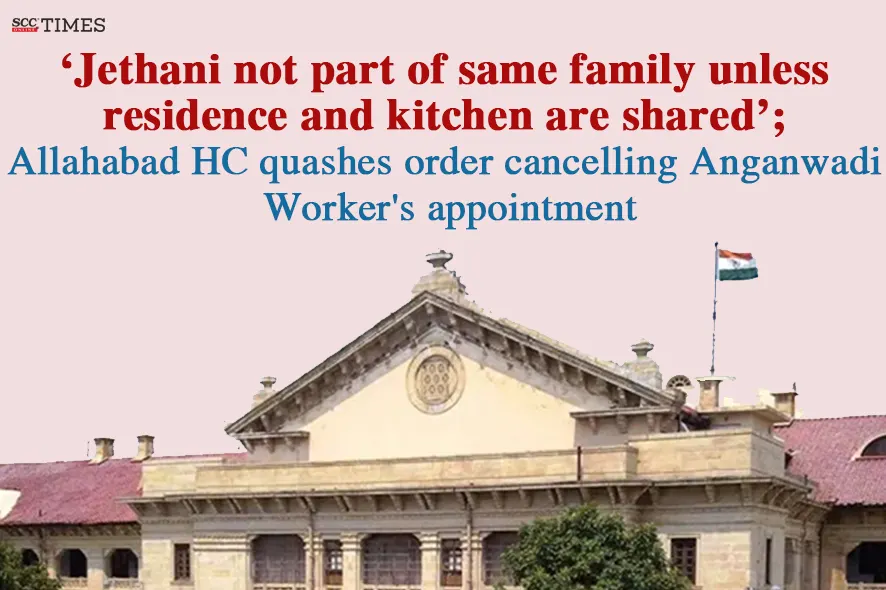Allahabad High Court: In a petition filed seeking the quashing of the order passed by the District Programme Officer, Bareilly, which had cancelled the appointment of the petitioner as an Anganbari Worker, the Single Judge Bench of Ajit Kumar, J. said that there was no material on record to establish that the petitioner and her sister-in-law (Jethani) were part of the same household or shared a common kitchen. Therefore, it could not be held that both women belonged to the same family within the meaning of the Government Order dated 21-05-2023, which prohibits the appointment of two women from the same family at the same Anganbari centre.
The Court further held that the impugned order was vitiated not only on merits but also for being in violation of the principles of natural justice, as it had been passed without affording the petitioner any opportunity of hearing.
Background
The order was primarily based on the ground that the petitioner’s sister-in-law was also employed as an Anganbari Assistant in the same block, and the relevant Government Order does not permit the posting of two women from the same family at the same center, one as an Anganbari Worker and the other as an Anganbari Assistant.
The petitioner submitted that the impugned order was passed without any notice or opportunity for hearing to the petitioner. Since the order carries adverse civil consequences, it was contended that the petitioner ought to have been given a chance to explain her position in defense of the appointment order.
On the legal aspect of the bar created under the Government Order dated 21-5-2023, for the petitioner referred to Clause 12(iv) of the said order, which only restricts the appointment of two women from the same family as Anganbari Worker and Anganbari Assistant at the same center. The relevant provisions of the Government Order, as reproduced, it was argued that the petitioner’s sister-in-law lives in a separate house with a distinct house number. Therefore, it was asserted that she does not fall within the definition of the petitioner’s family. Though she belongs to her father-in-law’s family, she does not constitute part of the petitioner’s family for the purposes of the Government Order.
In support of this submission, the petitioner referred to the relevant family register document, which indicates that the petitioner’s husband resides in house number 126, whereas the petitioner’s sister-in-law resides in a separate house, numbered 107.
Additionally, the petitioner referred to the definition of ‘family’ as outlined in the medical assistance rules for government employees. The family for medical purposes includes the husband, wife, parents, step-son, unmarried/divorced/deserted sisters, minor brothers, and step-mother. Thus, the petitioner submitted that, by no stretch of imagination, can the sister-in-law be considered as falling within the definition of “family” for the purposes of selection and appointment to the post of Anganbari Worker.
Analysis and Decision
From the discussion made above, with reference to various service rules and the definition of “family” as provided under the Code of Civil Procedure, 1908 (‘CPC’), the Court opined that a sister-in-law cannot, in all circumstances, be treated as a member of the same family as the petitioner. A sister-in-law may be considered a member of the same family only in cases where both brothers are residing together, sharing a common household and kitchen.
In the present case, the Court noted that there is no material to establish that the petitioner and her sister-in-law are part of the same household or share a common kitchen. Therefore, it cannot be said that both women belong to the same family for the purposes of the Government Order dated 21-05-2023.
In view of the above, the Court held that the impugned order dated 13-06-2025, cancelling the petitioner’s appointment, is rendered unsustainable not only on the ground of violation of the principles of natural justice, having been passed without affording the petitioner an opportunity of hearing, but also on merits.
The Court directed the District Programme Officer, Bareilly to reinstate the petitioner to the post of Anganbari Worker forthwith and permit her to discharge her duties without any further delay. The petitioner shall be paid her monthly salary regularly from the date of reinstatement. In addition, the petitioner shall be entitled to all consequential benefits, including arrears of salary for the period during which she was denied employment in consequence of the impugned order.
[Kumari Sonam v State of UP, 2025 SCC OnLine All 5446, decided on 12-08-2025]
Advocates who appeared in this case :
Counsel for Petitioner:- Anil Kumar Prajapati,Kuldeep Kumar Mishra
Counsel for Respondent:- C.S.C


